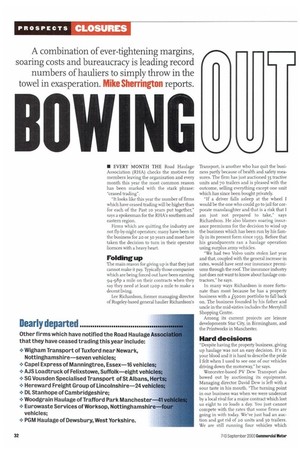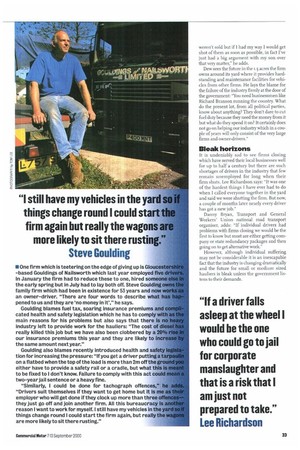OWI N G
Page 34

Page 35

If you've noticed an error in this article please click here to report it so we can fix it.
A combination of ever-tightening margins, soaring costs and bureaucracy is leading record numbers of hauliers to simply throw in the
towel in exasperation. Mike Sherrington reports.
• EVERY MONTH THE Road Haulage Association (RHA) checks the motives for members leaving the organisation and every month this year the most common reason has been marked with the stark phrase: "ceased trading".
It looks like this year the number of firms which have ceased trading will be higher than for each of the Past ro years put together," says a spokesman for the RHA's southern and eastern region.
Firms which are quitting the industry are not fly-by-night operators; many have been in the business for zo or 30 years and most have taken the decision to turn in their operator licences with a heavy heart.
Folding up
The main reason for giving up is that they just cannot make it pay. Typically those companies which are being forced out have been earning 94-98p a mile on their contracts when they say they need at least 120 a mile to make a decent living.
Lee Richardson, former managing director of Rugeley-based general haulier Richardson's Transport, is another who has quit the business partly because of health and safety measures. The firm has just auctioned 35 tractive units and 70 trailers and is pleased with the outcome, selling everything except one unit which has since been bought privately.
"If a driver falls asleep at the wheel I would be the one who could go to jail for corporate manslaughter and that is a risk that I am just not prepared to take," says Richardson. He also blames soaring insurance premiums for the decision to wind up the business which has been run by his family in its present form since 1953. Before that his grandparents ran a haulage operation using surplus army vehicles.
"We had two Volvo units stolen last year and that, coupled with the general increase in rates, would have sent our insurance premiums through the roof. The insurance industry just does not want to know about haulage contractors," he says.
In many ways Richardson is more fortunate than most because he has a property business with a L500m portfolio to fall back on. The business founded by his father and uncle in the mid-sixties includes the Merryhill Shopping Centre.
Among its current projects are leisure developments Star City, in Birmingham, and the Printworks in Manchester.
Hard decisions
"Despite haying the property business, giving up haulage was not an easy decision. It's in your blood and it is hard to describe the pride I felt when I used to see one of our vehicles driving down the motorway," he says.
Worcester-based PV Dew Transport also bowed out by auctioning its equipment. Managing director David Dew is left with a sour taste in his mouth. The turning point in our business was when we were undercut by a local rival for a major contract which lost us eight to ro loads a day. You just cannot compete with the rates that some firms are going in with today. We've just had an auction and got rid of 20 units and 30 trailers. We are still running four vehicles which
weren't sold but if I had my way I would get shot of them as soon as possible, in fact I've just had a big argument with my son over that very matter," he adds.
Dew sees the future in the r.5 acres the firm owns around its yard where it provides hardstanding and maintenance facilities for vehicles from other firms. He lays the blame for the failure of the industry firmly at the door of the government: "You need businessmen like Richard Branson running the country What do the present lot, from all political parties, know about anything? They don't dare to cut fuel duty because they need the money from it but what do they spend it on? It certainly does not go on helping our industry which in a couple of years will only consist of the very large firms and owner-drivers."
Bleak horizons
It is undeniably sad to see firms closing which have served their local businesses well for up to half a century but there are such shortages of drivers in the industry that few remain unemployed for long when their firm shuts. Lee Richardson says: "It was one of the hardest things I have ever had to do when I called everyone together in the yard and said we were shutting the firm. But now a couple of months later nearly every driver has got a new job."
Danny Bryan, Transport and General Workers' Union national road transport organiser, adds: "If individual drivers had problems with finris closing we would be the first to know but most are either getting company or state redundancy packages and then going on to get alternative work."
However, although individual suffering may not be considerable it is an inescapable fact that the industry is changing dramatically and the future for small or medium sized hauliers is bleak unless the government listens to their demands,
















































































































